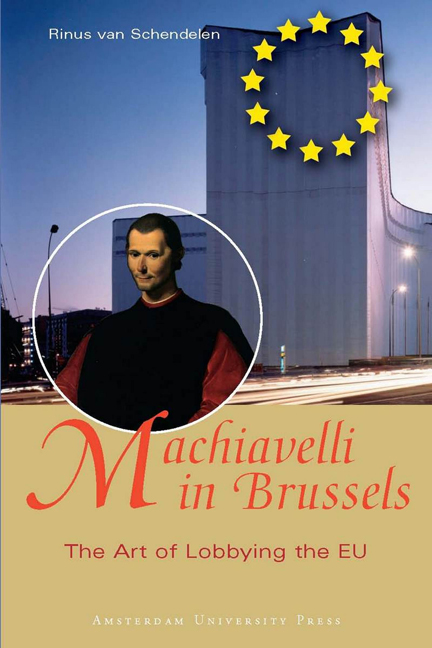Book contents
- Frontmatter
- Contents
- Detailed contents
- Preface
- List of Figures
- List of Abbrevatiations
- 1 The Europeanisation of Public Affairs
- 2 The Playing Field: EU Common Decision-Making
- 3 Pushing the Buttons of ‘Brussels’
- 4 Managing the EU Arena
- 5 Managing the Home Front
- 6 Managing the Fieldwork
- 7 The Limits of EU Public Affairs Management
- 8 Lobbying and EU Democracy
- References
- Index
3 - Pushing the Buttons of ‘Brussels’
Published online by Cambridge University Press: 14 January 2021
- Frontmatter
- Contents
- Detailed contents
- Preface
- List of Figures
- List of Abbrevatiations
- 1 The Europeanisation of Public Affairs
- 2 The Playing Field: EU Common Decision-Making
- 3 Pushing the Buttons of ‘Brussels’
- 4 Managing the EU Arena
- 5 Managing the Home Front
- 6 Managing the Fieldwork
- 7 The Limits of EU Public Affairs Management
- 8 Lobbying and EU Democracy
- References
- Index
Summary
Managing the Crucial Variables
The ultimate goal of public affairs management (PAM) is to achieve a complete victory in a supposedly interesting game. The victory is complete if one has gained the desired outcome from the EU, received substantial support from the other stakeholders, and succeeded in overcoming opposition at home comfortably. The chance of such a full score is, however, low. In real-life, competition in the EU is usually extremely strong and hard. EU officials act under many cross-pressures, competitors quietly hold the belief that it is in their common interest to prevent one player gaining all, and other interest groups at home may feel threatened if one achieves a full score at EU level. Every player, therefore, has reason to be already satisfied if it has won the game only partially and/or has maintained its position in the fighting arena and/or has kept its home organisation on its side. Compromise, respect and backing might be seen as second-class prizes to win, but are in reality frequently valued as the highest attainable and thus as satisfying ones. They give a prolonged licence to operate.
Of course, one may completely lose as well. In this case, one is not party to the compromise and/or one gets less respect from others and/or one loses backing at home. But as long as a pressure group continues to play actively and prudently, it seldom runs this risk. By participating actively it usually becomes part of the compromise and by acting prudently it can both retain respect for its position and maintain its backing at home. In short, the full score is normally only a daydream and the complete defeat only a nightmare. Both rarely occur, but, paradoxically, both have their useful functions. Without the daydream of becoming the complete winner and without the nightmare of ending up as the complete loser, no sportsman can ever hope to become a competitive player.
The desired outcome can be anything coming from the EU. The main field of desires is usually legislation, because this is expected to be binding on those whom it concerns and to supersede domestic laws. An interest group may desire, for example, a change to the Treaty, a piece of either secondary or delegated legislation (a directive, regulation or decree), a Court decision, or the granting of an exemption to a rule.
- Type
- Chapter
- Information
- Machiavelli in BrusselsThe Art of Lobbying the EU, pp. 91 - 130Publisher: Amsterdam University PressPrint publication year: 2004



